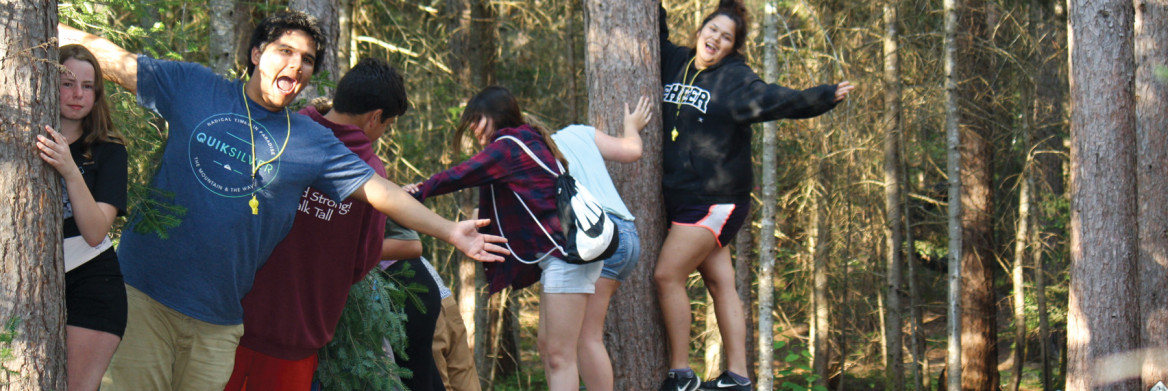Related link
Each morning before the fun and games begin, youth at Niigan Mosewak summer camp gather in a circle to share their stories. But they aren't your typical campfire tales — the youth attending this camp are here for more than just a summer holiday.
"During the circles I often cry,
" says Angel Armstrong, one of the youth mentors at the camp. She began attending Niigan Mosewak following the death of her father by suicide 10 years ago.
"It was a huge tragedy, he was so involved in our family,
" says Armstrong, who is now 18. "It's not always easy, but I'm learning to honour the life he shared with us, and this camp has helped me do that.
"
Niigan Mosewak, which means "moving forward" in Ojibwe, is a week-long summer camp for at-risk indigenous youth run by the Ontario Provincial Police (OPP). For the past 10 years, it's provided a safe space for youth to talk about issues like suicide, mental health and substance abuse, while learning about indigenous history and culture through games and activities.
Retired OPP officer Sgt. George Couchie co-created the camp with other members of the OPP's Indigenous Policing Bureau as a way to help guide youth, while reconnecting them with their cultural identities.
"We looked at some of the problems in indigenous communities — the high drug rate, alcoholism and high suicide rate, and looked at what the residential schools took out — the culture, language and self-esteem,
" says Couchie, who is from the Nipissing First Nation. "That's what we're trying to re-introduce. It's all about helping kids understand where they come from.
"
Changing lives
Niigan Mosewak ran three times last summer in Trout Creek, just south of North Bay, Ont. Teachers and police across Ontario referred about 100 youth between the ages of 13 and 17 to the camp. Those older than 17 can attend the camp as mentors, like Armstrong.
Members of the OPP, RCMP, North Bay Police, Anishinabek Police Service and the United Chief and Council of Manitoulin support the camp, which is mostly funded by Ontario's Ministry of Children and Youth Resources.
Couchie says the police leadership is vital because it provides youth with strong role models and helps foster positive police relationships.
"We don't often get the chance to sit down and have conversations with troubled struggling youth,
" he says. "I learn a lot from those kids, you really build empathy by listening to their stories.
"
Cpl. Carol Clarke, an RCMP officer seconded to the OPP's Indigenous Policing Bureau, works as a facilitator at the camp. As an indigenous police officer, she's an important role model for the girls at the camp. She works with Couchie and other police officers to run the camp's activities, which focus on teaching traditional skills like making medicine pouches and cedar pillows, sweet grass braiding, building sweat lodges and drum building.
Positive messages
One of Clarke's favourite activities happens near the end of week. Every camper tapes a piece of paper to their back, and the kids have an opportunity to write positive anonymous messages about each other.
"It's fun and everyone is really surprised at the nice things people think and say about them,
" says Clarke. "We tell them to keep the paper because they can pull it out when they feel sad or low.
"
She recalls one girl in particular who attended the camp several times. One summer, the young girl confided in Clarke, explaining how the messages from her peers saved her life.
"She told me she was going to commit suicide. She had a plan, no one was home, and she was cleaning up her room before and found those papers and read them. And she's here with us today…all from that piece of paper.
" Clarke says the camp gives her a sense of pride and of hope for future indigenous generations. "We have to keep this going. It's really changed kids' lives.
"
As for Armstrong, she says the camp has encouraged her to get involved in her community, take on more leadership roles and connect with her indigenous roots.
"After I attended the camp, I became more aware and interested in the things my people do, and our way of life,
" she says. "I always share that this camp has forever changed and saved my life.
"
